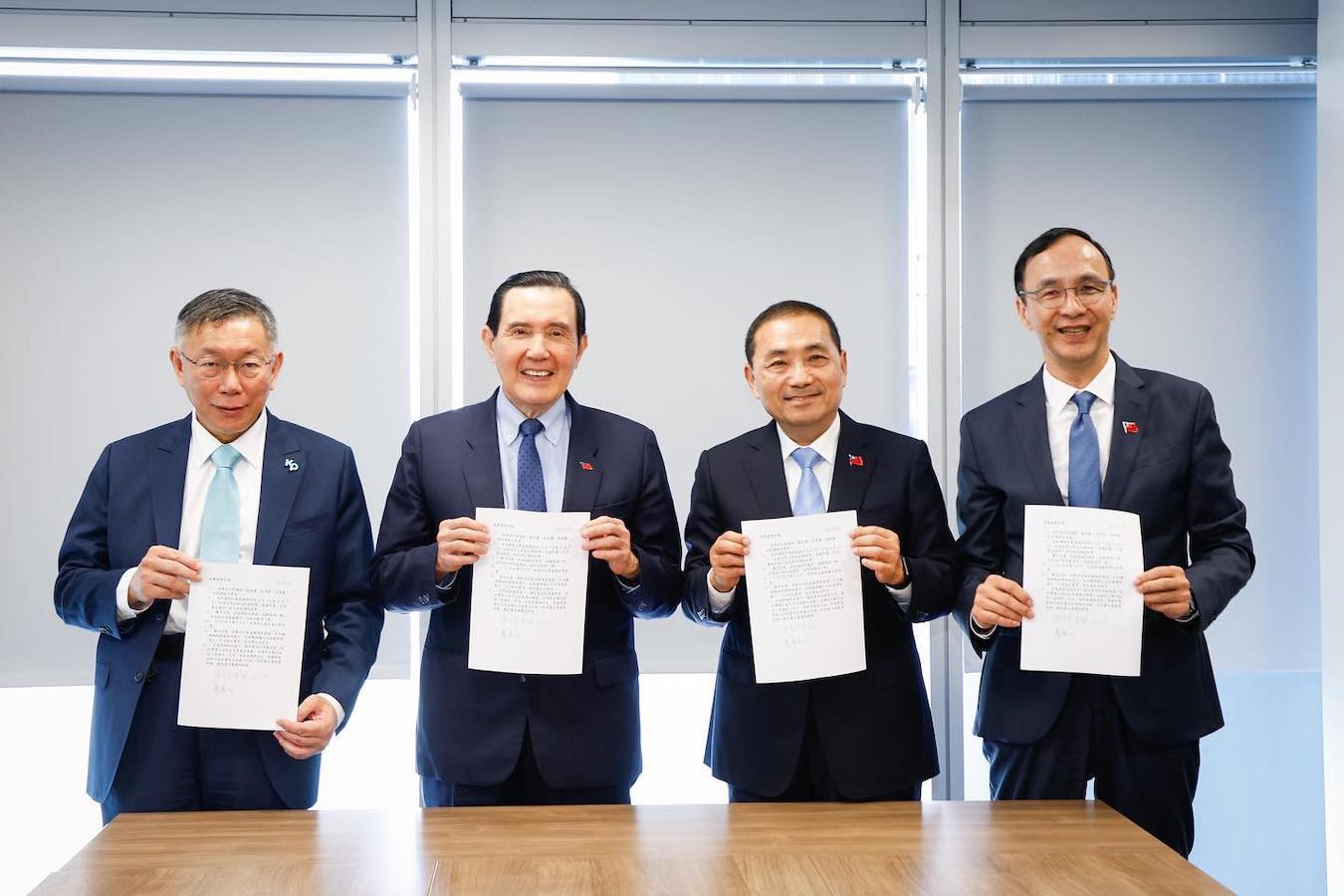by Brian Hioe
語言:
English
Photo Credit: KMT/Facebook
AFTER WEEKS OF speculation, the TPP and KMT agreed to a joint presidential ticket today. This announcement took place after a meeting today between TPP presidential candidate and chair Ko Wen-je, KMT chair Eric Chu, KMT presidential candidate Hou You-yi, and former president Ma Ying-jeou.
In previous discussions regarding the possibility of cooperation in the past month, the TPP and KMT sparred over how to determine the candidate. The KMT preferred in-person primaries, where voter IDs would be checked, while the TPP preferred telephone polls. The TPP likely preferred telephone polls because they showed Ko as ahead of Hou. As such, the TPP alleged that the KMT was seeking to rig the process.
Although the KMT was emphatic on its position, it eventually compromised to allow for telephone polls. This occurred after Ma Ying-jeou and Han Kuo-yu, the KMT’s 2020 presidential candidate, backed telephone polls. Some interpreted this as KMT heavyweights seriously weighing swapping out Hou, as an obstacle to cooperation between the KMT and TPP would otherwise be the KMT potentially seeing it as a blow to its esteem as a party if its candidate became the vice presidential candidate of an upstart party.
Nevertheless, the two parties still fought over the means that a telephone poll would be conducted. The TPP preferred mobile polling, seeing as this would lead to a younger sample, and this would favor the TPP’s younger voting base. By contrast, the KMT wanted a survey of both a prospective voter’s preferred party and the preferred candidate to determine who was chosen, seeing the KMT’s party base is still larger than that of the TPP.
 From left to right, TPP chair and presidential candidate Ko Wen-je, former president Ma Ying-jeou, KMT presidential candidate Hou You-yi, and KMT chair Eric Chu. Photo credit: KMT/Facebook
From left to right, TPP chair and presidential candidate Ko Wen-je, former president Ma Ying-jeou, KMT presidential candidate Hou You-yi, and KMT chair Eric Chu. Photo credit: KMT/Facebook
As presidential candidates need to register between November 20th and 24th, new polls will not be conducted. Instead, the KMT, TPP, and the Ma Ying-jeou Foundation will each choose a pollster, who will assess the best candidate based on polls conducted between November 7th and November 17th. As such, it is still somewhat opaque as to what the exact weighting of the polls will be.
The KMT and TPP’s joint candidate, then, will be announced on November 18th.
The presence of Ma Ying-jeou at the negotiating table and in determining pollsters proves unusual. Yet this perhaps attests to the significant influence of the former president in the KMT at present.
It is still unclear what role independent pan-Blue candidate Terry Gou will play in this process. Ko previously called for Gou to also have a place in the negotiations. Ahead of today’s meeting, Gou and Ko both stated that their political campaigns remained in contact. With Gou having now collected over 900,000 valid petition signatures for his independent run–the second-highest number of petition signatures for an independent run in Taiwanese history, only to James Soong in 2000–Gou stated whether he decided to run or not would be decided after consulting with Ko.
It may still be too early to conclude that the TPP-KMT alliance will genuinely take place. There is plenty of room for either Ko or Hou to dispute the fairness process if the results are disfavorable to them, with Ko more likely to break from the KMT in order to maintain his brand as an independent pan-Blue candidate. Throughout negotiations with the KMT, Ko has framed the KMT as unfairly bullying the smaller pan-Blue party of the TPP.
Likewise, Ko has a noted history of unpredictably breaking from prospective political allies, this including former KMT majority speaker Wang Jinpyng and Gou himself. Even if Ko proved willing to serve as Hou’s vice-president, he could still attack Hou to try and maintain his independent political reputation.
To this extent, some voters may be disillusioned if they see their preferred candidate sidelined by the other. Some KMT voters may not be willing to vote for Ko Wen-je if he becomes the presidential candidate over Hou, while some TPP voters may become disillusioned with the party’s claim to represent qualitatively different politics than the two major parties of the DPP and KMT if it aligns with the KMT. As such, a KMT-TPP alliance does not necessarily mean a defeat for the DPP either, with there still being plenty of room for missteps along the way.

